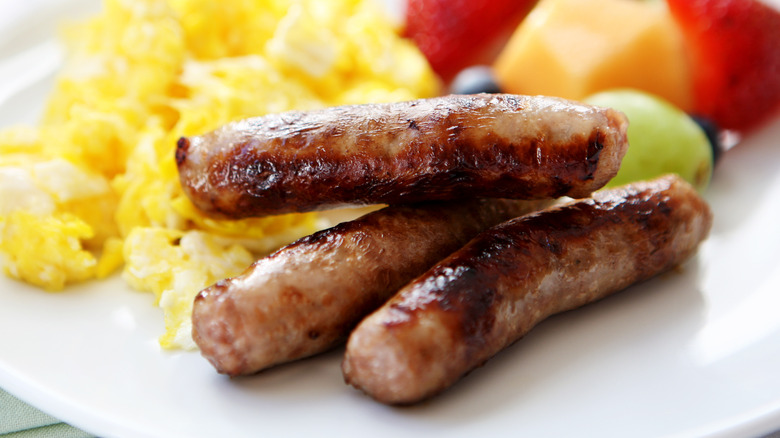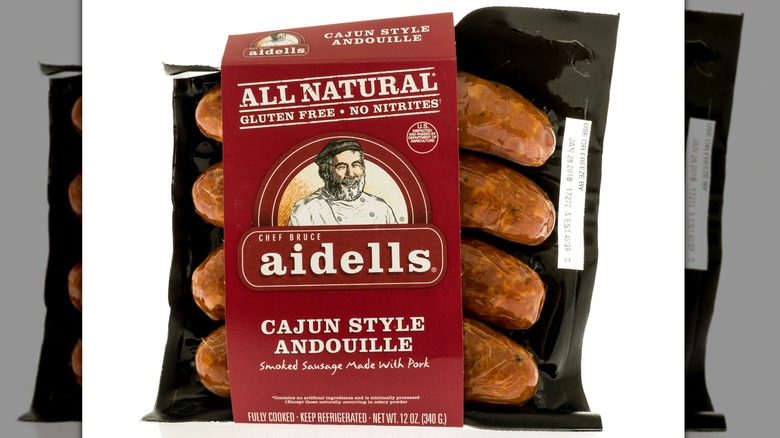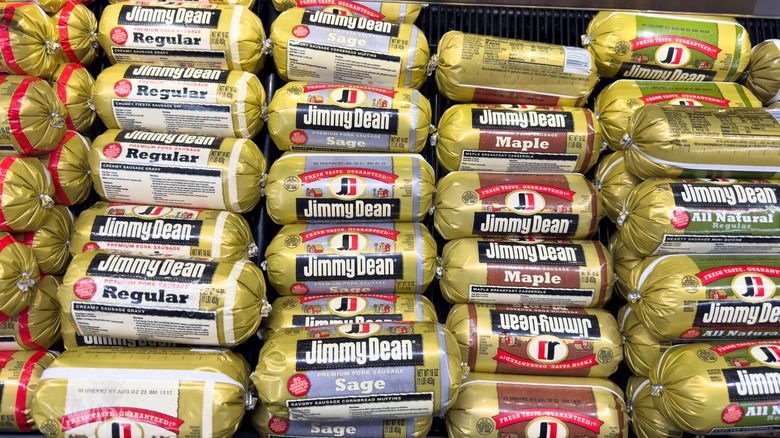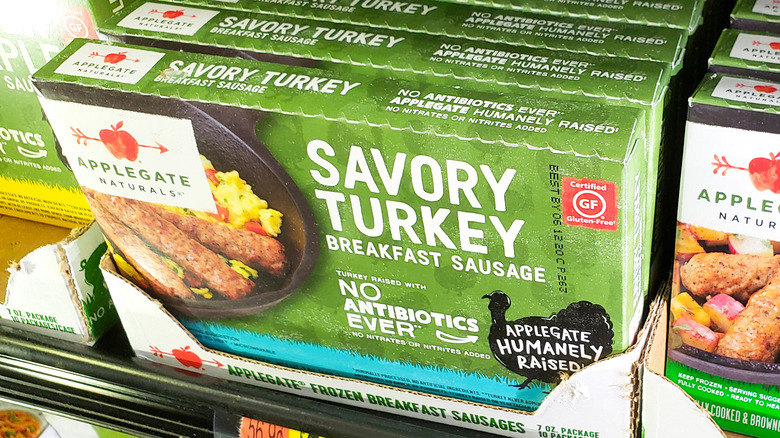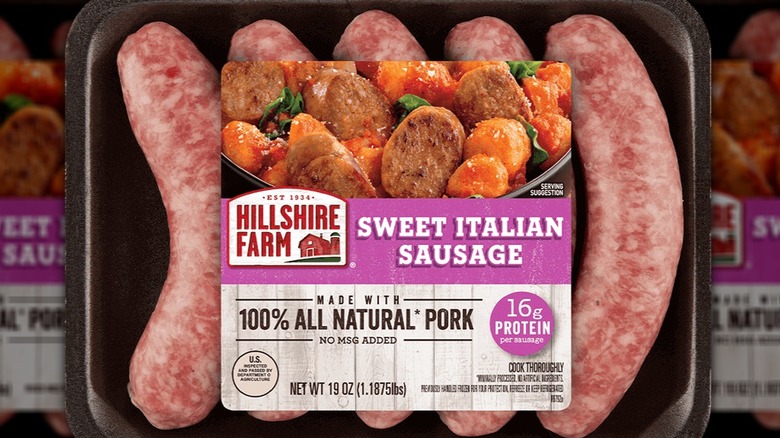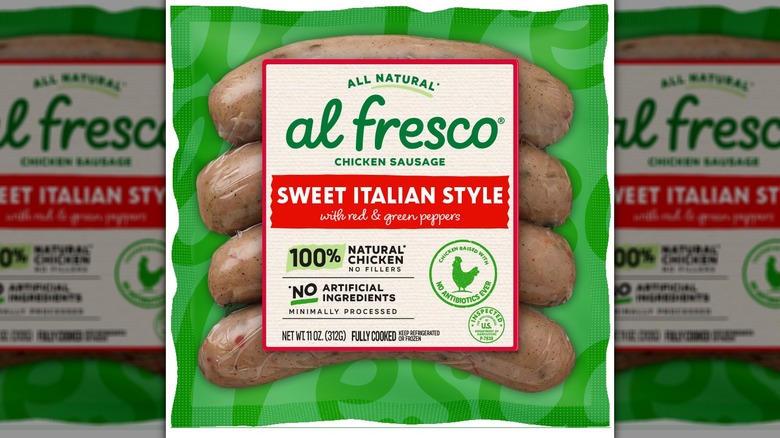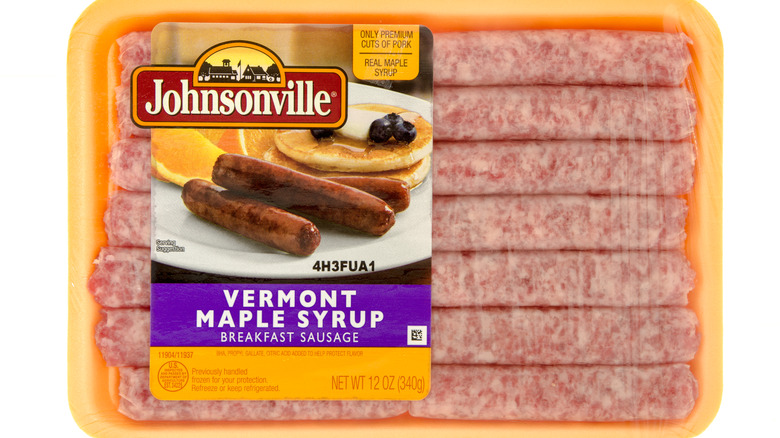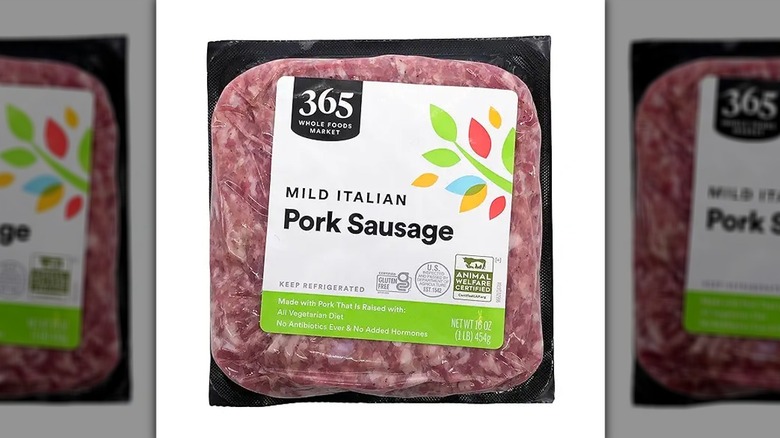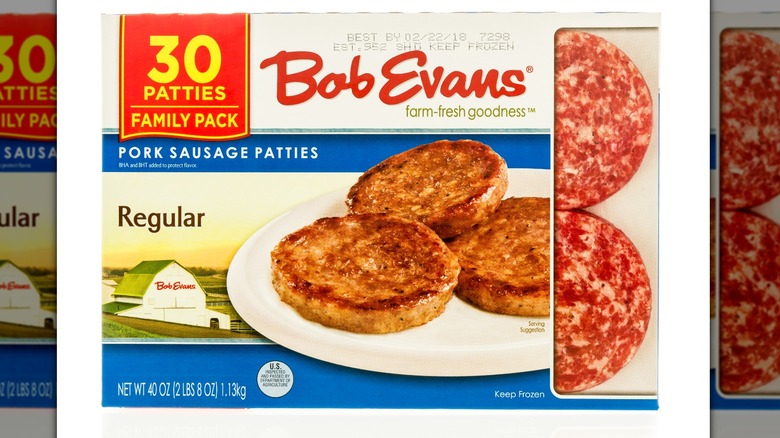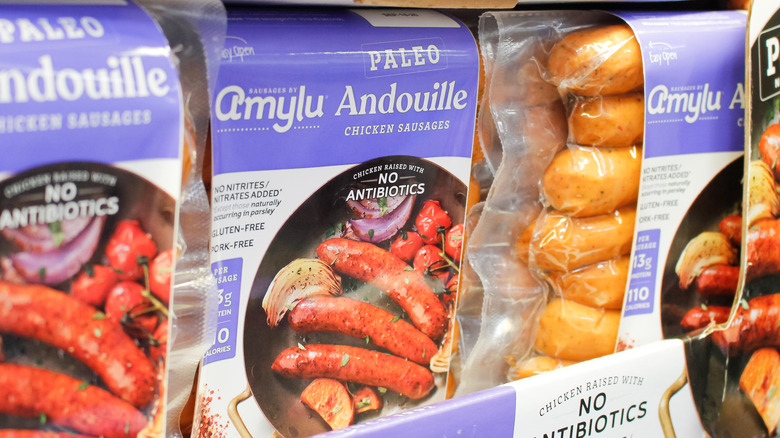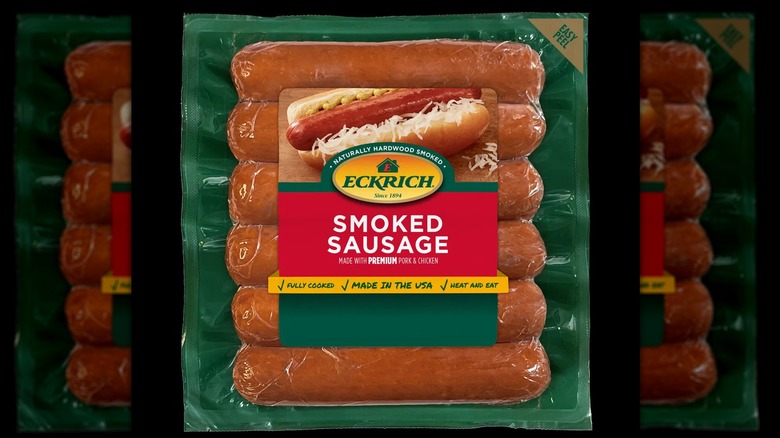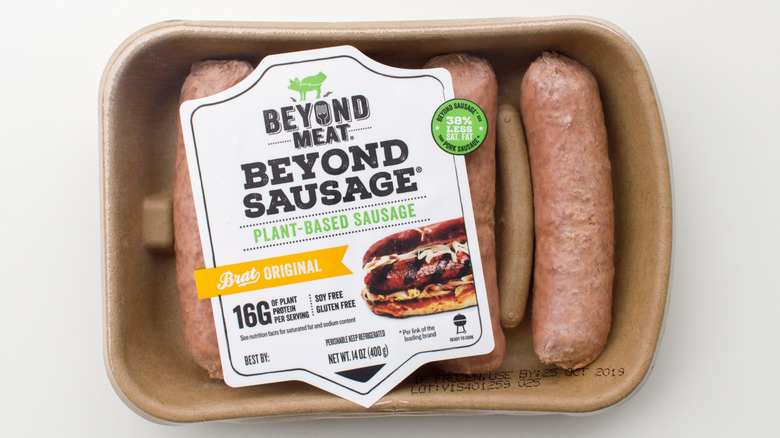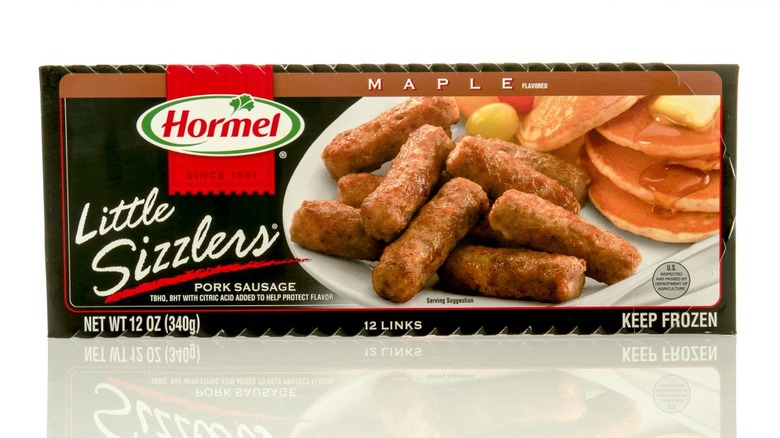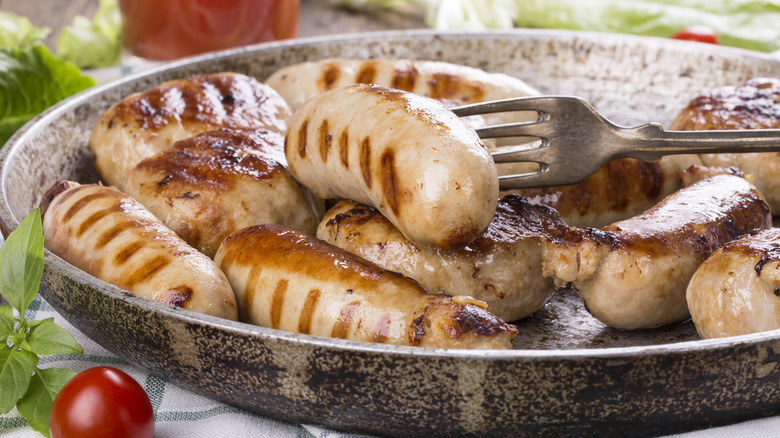Sausage Brands With The Best And Worst Ingredients
While flavor is one of the most important attributes of a good sausage, the ingredients list is also crucial to consider. Not all sausages are created equal when it comes to high-quality ingredients with nutritional benefits. High fat and sodium can set some brands apart. Additionally, whether it's artificial additives or extra sugar, some sausage brands have extra ingredients that aren't always part of a balanced diet. Fortunately, there are plenty of delicious options that use the best ingredients to deliver delectable flavor. You can analyze the ingredients list to see what is present in the highest amounts and which are added for flavor or other purposes.
Most of the things to watch out for are added to change the texture or flavor of the sausage and make it last longer in the fridge or on the shelf. They may not be harmful in small quantities, which the Food and Drug Administration regulates. But some studies have linked these ingredients to health issues, especially when someone consumes them for a long period of time or in large quantities. So before you make sausage a part of your regular eating habits, look at the packaging to make sure you're choosing a brand that uses the best ingredients. The first ingredients listed make up the largest portion of the overall product. So if you don't recognize many of the things listed, it might be a good idea to keep looking for a better sausage.
Best: Aidells
All of Aidells All Natural collection of delicious sausages are free of additives, monosodium glutamate (MSG), added nitrates, and sodium phosphate. Plus, there are plenty of flavor options that use ingredients that we can recognize like garlic, sugar, and spices. The popular Chicken & Apple Smoked Chicken Sausage, which is sold in grocery stores and large warehouse-style stores in bulk, lists chicken and dried apple as the first two ingredients. That's good news since these are the two dominant aspects of the product. Chicken is also leaner than pork or beef, resulting in a sausage that has less fat than its counterparts made with different meats. These have a low saturated fat content per serving — just 18% of the recommended daily value. The rest of the ingredients are used to add flavor, including salt, celery powder, fruit juice, and a secret spice blend. While considered safe in moderation, MSG may cause sensitivity reactions in some people, leading to headaches and nausea, so it's also a positive that these sausages are MSG-free.
Plus, the chicken used is raised without being pumped full of antibiotics. It is still considered generally safe to consume poultry treated with a regulated amount of antibiotics, but high amounts of antibiotics can lead to resistant bacteria, which can be harmful to humans. If you do want to go completely antibiotic-free for this reason, these chicken sausages fit the bill. They also have a lot of protein at 13 grams, while the Cajun Style Andouille Smoked Pork Sausage has a comparable 12 grams.
Worst: Jimmy Dean
Many of Jimmy Dean's sausage products have added MSG, which is linked to food sensitivities in some people. This ingredient is added to a variety of Jimmy Dean sausages from the breakfast links to the Heat 'n Serve options. The ingredients list for their sausages (all-natural and traditional sausage rolls) also includes natural flavor. This covers all flavoring agents that come from natural sources, such as spices, oils, and powders. This can be a bit misleading, since it doesn't list the specific ingredients, making it difficult for those with food sensitivities to know exactly what they are eating.
In the Jimmy Dean Regular Premium Pork Sausage, corn syrup and sugar are also added as a sweetener. Each serving has 35% of the recommended daily value of saturated fat and only 9 grams of protein. The sausage recipe also comes in other varieties, including sage and maple, with slightly different flavor profiles. However, the ingredient lists are similar other than the flavorings added, frequently relying on corn syrup and sugar to sweeten them up. While these sausages only end up with 1 gram of sugar, some comparable varieties from other brands contain no sugar at all.
Best: Applegate Naturals
The ingredients list of Applegate Natural Classic Pork Breakfast Sausages is just five items long. The sausages are made of pork, water, cane sugar, salt, and spices. Applegate Naturals even provides a detailed description of the spice blend, which is made of sage, black pepper, white pepper, red pepper, and ginger. These are all ingredients we recognize and might even have in our pantry — a sure sign that this is a high-quality list of ingredients. The sausage is free of added nitrites and MSG. Nitrites help preserve the meat but can cause health issues if consumed in large quantities, cooked in high temperatures, or not closely monitored during the production process. The Applegate Natural Classic Pork Breakfast Sausage also has a relatively low amount of sodium at just 17% of the recommended daily limit per serving.
The chicken, pork, and other sources used in other Applegate sausages are humanely raised and not given antibiotics or hormones. The line-up of dinner sausages is made with antibiotic-free chicken and includes many organic ingredients as well, although this may boost the sodium levels. If you are looking for the best sausages for animal welfare, you'll be happy to learn about where Applegate Naturals sources its meat. The company includes detailed information about the farms where the chickens, pigs, and turkeys live, including videos that show the animals' conditions and welfare.
Worst: Hillshire Farm
The Summer Sausage from Hillshire Farm is made of a blend of pork and beef. While this is common with summer sausage, it might cause some issues for those with food sensitivities or those trying to avoid certain types of meat. You can find summer sausage made with just one type of meat, typically beef or pork, but Hillshire Farm only makes a blended version and an all-beef version. These contain ingredients like citric acid, sodium nitrite, dextrose, and the mysterious natural flavor ingredient. These ingredients aren't necessarily harmful but they do mean a more processed sausage, which can change the nutritional benefits of the original ingredients.
Hillshire Farm also has other sausages available in plenty of flavors and styles, such as sweet Italian sausage, and is carried by many mainstream grocery chains. Nitrites and MSG are common additives, although the raw meat sausages tend to have shorter ingredient lists than their smoked counterparts. They also tend to be high in saturated fat and sodium, both ingredients at around 30% of the recommended daily value per serving. If you like the flavor of Hillshire Farm sausages, try one of the raw meat varieties rather than the pre-cooked options for a less-processed version.
Best: Alfresco
While each type of sausage has its own spice and flavor blend, the meats used in Alfresco sausages are free from antibiotics. The sausages also don't have artificial ingredients or additives. In the ingredients list of the Sweet Italian-Style chicken sausage from Alfresco, the first two listed are chicken and peppers (red and green). This is notable because even some of the other great sausages on our list have water listed before any spices or seasonings.
These sausages make sure to use ingredients that we know and can recognize that are also hearty and full of nutrition, adding to macro counts of around 13 grams of protein. The saturated fat is very low at just 8% of the recommended daily limit per serving. The sausages do include natural flavors, so if you have food sensitivities, it might be worth doing some extra research before deciding on the right sausage for your needs.
Worst: Johnsonville
Some of the tastiest of Johnsonville's sausages, such as the popular Brown Sugar & Honey Breakfast Sausage, contain added sugar. Even the Original Breakfast Sausage recipe includes corn syrup within the first three ingredients, listed only after pork and water. They are nitrite-free but still not the healthiest options on the market due to their long list of added ingredients, including extra sugars and a high amount of saturated fat, the latter adding up to 24% of a person's daily intake.
Butylated hydroxyanisole (BHA) is also added to prevent oxidation and preserve the sausage longer. According to the Sixth Annual Report on Carcinogens, first published in 1991, BHA was initially believed to have a chance of being carcinogenic in humans. However, more recent research published in Regulatory Toxicology and Pharmacology in 2021 has found that BHA "poses no safety concerns to humans at the levels found in our diet." Fortunately, the FDA regulates the amount of BHA that can be added to foods and cosmetics. Still, this might be one that you want to steer clear of in favor of a less-processed fresh version, or even making breakfast sausage yourself with fewer ingredients.
Best: 365 by Whole Foods Market
365 by Whole Foods Market sausages are free of artificial additives and use spices and lemon juice concentrate to preserve freshness and flavor. The brand details the specific spices used to give flavor, which include multiple kinds of peppers and sage. There are also pre-cooked frozen varieties that use the same ingredients, including similar spice blends. The ground sausages use the same ingredients and allow you to customize the shape or add them to other dishes. Because the meat content is so high in these sausages, they have an impressive 12 grams of protein but only 20% of the recommended daily value of saturated fat in each serving.
If you're looking for a sausage that takes animal welfare into consideration, this is a good choice. All of the meat is animal welfare certified by the Global Animal Partnership. Even for the base certification, the producer must meet over 100 animal welfare standards, including adequate space for the animals and a vegetarian diet that is free of animal by-products. Additional measures at higher tiers of certification include enrichment materials in the animals' environment. The front packaging clearly states the certification information, including which tier they meet.
Worst: Bob Evans
Along with a blend of spices giving the sausage its signature flavor, this tasty version from Bob Evans has MSG in the ingredients list, which is relatively short and lists pork and water as the top two ingredients. But others also include potassium lactate, an additive which helps prevent bacteria growth and spoilage. The problem with this is that it may trigger sensitivities in some nd generally means that the food is more processed. It is a good alternative for those looking to lower their sodium intake, however, since it serves the same purpose as sodium lactate, which is not included in this sausage blend.
If you love the Bob Evans taste but want to avoid MSG, look for the Bob Evans Naturally! range, which uses natural flavoring ingredients instead of MSG. It also doesn't include as much added sugar as some of the other Bob Evans sausage products. You might see the Naturally! brand listed as "All Natural," which is the same product with the same MSG-free ingredients list.
Best: Amylu
Amylu sausages are free of MSG and nitrites, plus the chicken used in the chicken sausages is raised without antibiotics. All chicken used in Amylu sausages comes from hormone-free sources. Some of the sausages are certified by the Global Animal Partnership and meet animal welfare standards, but not all of them do. Amylu also includes some organic offerings. It's important to look at the labels closely because there are a lot of Amylu sausage products and not all of them have the same certifications or ingredients.
There are a lot of flavor variations, each with its own blend of spices to give it a unique flavor. The specific spices are listed in the ingredients list for each sausage, making it easy to know exactly what you are eating. If you have sensitivities or preferences, these sausages are some of the best because their ingredients list is so transparent. They only make chicken sausages, however. If you prefer pork, beef, or turkey, you will be disappointed to find that these are not available. But because chicken is a lean meat, each serving of the Andouille Chicken Sausages only has 3% of the recommended limit for saturated fat and 12 grams of protein. Overall, they're a great choice for a summer cookout or Memorial Day grill.
Worst: Eckrich
Eckrich Smoked Sausage is made of a blend of pork and chicken and contains a lot of additives, such as MSG and sodium nitrite. Corn syrup is also listed in the first few ingredients after the various meats and water. The ingredients list includes numerous chemical-based additives for flavor and preservation rather than easy-to-recognize spices. While they might not be harmful to your health, they still are more processed than other options in the grocery store. This smoked sausage also has around 30% of the recommended limit of saturated fat per serving.
These smoked sausages include mechanically separated chicken. This means that the chicken paste used to make the sausages was ground up from meat and bones before passing through a sieve to separate the inedible portions. While it is considered safe to eat by the FDA and paves the way for many sausage-based recipes, such as mustardy kielbasa pasta, it isn't the most appealing way to eat meat.
Best: Beyond Sausage plant-based links
These vegan sausages taste like the real deal (thanks to a special spice blend), and get their protein content from peas. Coconut oil is another ingredient in these plant-based sausage alternative links, which are the exception to our rule when it comes to keeping a short ingredient list free of additives. Plant-based sausages require a lot of extras to get their original ingredients to replicate the taste and texture of meat. But Beyond Meat uses high-quality protein sources rather than soy, which is common in plant-based meat alternatives and can cause digestive issues in those sensitive to it. They are also made without gluten or genetically modified organisms (GMOs).
There are a lot of added coloring agents in these Beyond Sausage links, so do your research if chemical-based coloring ingredients are an issue for you. Fortunately, Beyond Sausage is transparent in the ingredients list so you know exactly what you are getting and how each faux sausage is made. If you are trying to cut down on cholesterol, the Brat Original sausages are a great choice because they are cholesterol-free but still contain 16 grams of plant-based protein.
Worst: Hormel
With a lot of additives, Hormel sausages rank as some of the worst ingredients on our list. Not only do some options, like the Hormel Italian Sausage, have MSG, but they also contain tertiary butylhydroquinone (TBHQ) and butylated hydroxytoluene (BHT). Both are used as preservatives but have been linked to harmful health effects, even though WebMD confirms that BHT is thought to be safe in limited amounts, such as those you'll find in processed products. Meanwhile, a 2022 study published in Toxicology Reports found that TBHQ may have an "alarming" impact as a potential carcinogen or mutagen when consumers are exposed to high amounts over the long term. While the amount in food production is closely regulated and kept at safe levels, it does make us think twice before choosing a sausage with this ingredient included. Overall, these are some of the most processed options on the list.
Hormel also makes varieties of dried sausages which are popular to use to elevate frozen pizzas or as a snack. These are often made with a blend of meats, such as the Hormel chorizo sausage which is made of beef and pork. It includes salt and spices such as garlic powder and celery powder. But these sausages have a lot of preservatives to keep them fresh. Each serving also contains 23% of the recommended limit of saturated fat.
Methodology
We analyzed ingredient lists to find sausages that create delicious flavors without relying on additives or other ingredients that can be linked to a less-than-healthy diet. MSG, added nitrites and preservatives, and other additives were all red flags that made us think twice before adding these to a shopping list. If we had to do a lot of research to learn about the ingredients included, this meant that they were more processed and further away from the nutritional benefits of the meat, spices, or other ingredients used to make the sausages and their casings. We also looked at the nutritional profile. High levels of saturated fat and sodium were not the best, while high protein and low cholesterol counts made us want to give that sausage a try. Meat as the first ingredient and recognizable spices for flavoring were green flags for some of these sausages.
We also considered animal welfare and made special mention of those products with animal welfare certifications. Not only is this better for the animals, but it also means high-quality meat for the sausages in the end. Organic ingredients were also important to note since some consumers try to avoid items exposed to pesticides or other chemicals. The same was true of animals exposed to hormones or antibiotics.
